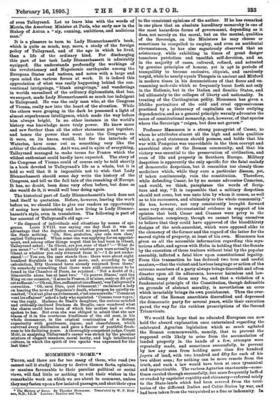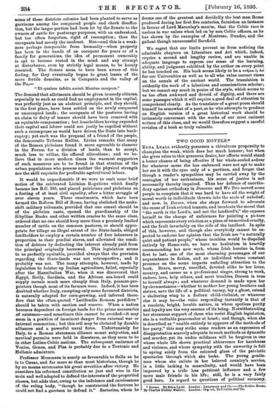MOMMSEN'S "ROME."* THOSE, and there are far too many of
them, who read (we cannot call it study) history to derive thence facts, opinions, or maxims favourable to their peculiar political or social views, will find little or nothing to suit their wishes in the remarkable work on which we are about to comment, unless they may fasten upon a few isolated passages, and shut their eyes
• 7714 History of Eons+. By Theodor Mommsen. Transisted by W. P. Dick- son, 7:1„D.. LL.D London : Eentley and Sun. to the consistent opinions of the author. If he has remarked in one place that an absolute hereditary monarchy is one of the most hazardous forms of government, depending as it does, not merely on the moral, but on the mental, qualities of the Sovereign, on the Ministers he may choose or sometimes be compelled to employ, and even on accidental circumstances, he has also sagaciously observed that an aristocracy, while exhibiting in times of great danger tenacious patriotism and unselfish self-devotion, and as, in the majority of cases, cultured, refined, and actuated by genuine principles of honour, yet is apt in periods of tranquillity to become exclusive, cliquish, and carelessly torpid, while he nearly equals Theognis in ancient and Mitford in modern times in his denunciations of that fierce and un- reasoning mob-rude which so frequently burst forth not only in the Hellenic, but in the Italian and Semitic States, and led ultimately to the collapse of liberty and nationality, in treating of the Carthaginian polity, Mommsen has given a lifelike portraiture of the cold and cruel oppressiveness practised by a plutocracy of capitalists on their outlying dependencies, and as a general principle warmly advocates the cause of constitutional monarchy, not, however, of that species where the Sovereign "reigns, but does not govern."
Professor Mommsen is a strong panegyrist of Caesar, to, whom he attributes almost all the high and noble qualities which a good statesman should possess, and holds that hia war with Pompeins was unavoidable in the then corrupt and anarchical state of the Roman community, and that his victory was essential to the preservation of civilisation, and even of life and property in Southern Europe. Military despotism is apparently the only specific for the fatal malady of democratic despotism, but it resembles too closely those medicines which, while they cure a particular disease, yet, if taken continuously, ruin the constitution. Therefore, while defending Camas, he by no means advocates Camarism, and would, we think, paraphrase the words of Scrip- ture and say, "it is impossible that a military despotism should not come, but woe unto him by whom it comes, as well as to his successors, and ultimately to the whole community." He has, however, not very consistently brought forward some very strong circumstantial evidence in support of his opinion that both Cmsar and Crassus were privy to the Catilinarian conspiracy, though we cannot bring ourselves to believe that they could have approved of the bloodthirsty designs of the arch-anarchist, which were opposed alike to the clemency of the former and the regard of the latter for the sacred rights of property, at least of his own. Mommsen has given us all the accessible information regarding this mys- terious affair, and agrees with Holm in holding that the Senate by the execution of these traitors without trial by the popular assembly, inflicted a fatal blow upon constitutional legality. From this transaction he has deduced two true and useful maxims,—that the violent and lawless language or action of the extreme members of a party always brings discredit and often disaster upon all its adherents, however harmless and law- abiding many of them may be, and that a violation of a fundamental principle of the Constitution, though defensible on grounds of abstract morality, is nevertheless an error which invariably brings its own punishment. Thus the over- throw of the Roman anarchists discredited and depressed the democratic party for several years, while their execution paved the way for the ruthless proscriptions of the Second Triumvirate.
We would fain hope that no educated European can now hold the absurd explanation once entertained regarding the celebrated Agrarian legislation which so much agitated the Roman commonwealth, namely, that to prevent the supposed evils likely to arise from the accumulation of landed property in the hands of a few, attempts were repeatedly made, and sometimes successfully, to prevent by law any man from holding more than five hundred jugera of land, with two hundred and fifty for each of his two eldest sons ; for nothing can be more remote from the truth, and such a law would have been at once tyrannical and impracticable. The various Agrarian enactments—some- times carried through successfully, but more frequently baffled or evaded by capitalist cupidity and chicanery—referred solely to the State-lands which had been severed from the terri- tories of the different Italian and Celtic States by war, and had been taken from the vanquished as a fine or indemnity. Is some of these districts colonies had been planted to serve as garrisons among the conquered people and check disaffec- tion, but the larger portion had been let by the Senate to the owners of cattle for pasturage purposes, with an understood, but too often forgotten, right of resumption ; thus the occupants had merely the usufruct. But—and this is a weak- ness perhaps inseparable from humanity—when property has been in the hands of an occupant for years or of a family for generations, the idea of permanent ownership is apt to become rooted in the mind and any attempt at disturbance, even by strictly legal means, to be keenly resented. The Senate seem to have been aware of this feeling, for they eventually began to grant leases of the more fertile domains, as in Campania and the valley of the Po,—
"Et qualem infelix amisit Mantua campum."
The demand that allotments should be given to needy citizens, especially to such as could find no employment in the capital, was perfectly just as an abstract principle, and they should, in the first place, have been settled on the newly conquered or unoccupied lands ; the occupants of the pastures having no claim to fixity of tenure should have been removed with an equitable compensation ; but leaseholders having expended their capital and labour could not justly be expelled without such a recompense as would have driven the State into bank- ruptcy; yet such was the proposal of a friend of the people, the democratic Tribune Rullus. Livius remarks that many of the Roman plebeians found it more agreeable to clamour in the Forum for a division of lands, than to accept, much lees to utilise, the offered allocations ; and we be- lieve that in more modern times the warmest supporters of such measures are to be found in that stratum of the urban populations who possess neither the physical strength nor the skill requisite for profitable agricultural labour.
It would be unpardonable if we were to omit some brief notice of the celebrated Licinian Rogations which finally became law B.C. 386, and placed patricians and plebeians on a footing of at least civil equality, after a bitter struggle of over eleven years. These enactments, which have been termed the Reform Bill of Rome, having abolished the make- shift military tribunate, provided that one consul should be of the plebeian caste, opened the guardianship of the Sibylline Books and other written oracles to the same class, ordered that no one should keep more than a precisely limited number of cattle on the common pastures, or should appro. priate for tillage an illegal extent of the State-lands, obliged landholders to employ a certain number of free labourers in proportion to their prEedial slaves, and alleviated the condi- tion of debtors by deducting the interest already paid from the principal originally borrowed. This legislation seems to us perfectly equitable, provided always that the provision regarding the State-lands was not retrospective ; and it probably was not. The many attempts, however, made by legislation to bolster up Italian agriculture, failed, especially after the Hannibalian War, when it was discovered that Egypt, Sicily, Sardinia, and the African sea-board could supply cereals much more cheaply than Italy, peasant-pro- prietors though most of its farmers were. Indeed, it has been doubted whether Italy, excepting only some favoured districts, is naturally adapted for corn-growing, and inferred there- fore that the often-quoted "Latifundia Romam perdidere " should be taken with caution and reserve. When a nation becomes dependent on foreign lands for the prime necessaries of existence—and sometimes this cannot be avoided—it may seem in a position of imminent danger from external war or internal commotion; but this evil may be obviated by durable alliances and a powerful naval force. Unfortunately for Italy, to a Roman statesman alliance meant subjection, and nautical pursuits were held in disesteem, as they seem to be in other Latino-Celtic nations. The subsequent eminence of Venice, Genoa, and Pisa is probably due to a Teutonic and Hellenic admixture.
Professor Efommsen is nearly as favourable to Sulla as he is to Ca3sar, and far more so than most historians, though he by no means extenuates his great severities after victory. He considers his reformed constitution as just and wise in the main and well adapted to defend the interests of the propertied claws, but adds that, owing to the indolence and carelessness of the ruling body, "though he constructed the fortress he could not find a garrison to defend it." Sertorius, whom he deems one of the greatest and decidedly the best man Rome produced during her first five centuries, furnishes an instance in favour of Lord Macaulay's maxim, that the Celtic race is useless in war unless when led on by non-Celtic officers, as he has shown by the examples of Montrose, Dundee, and the gallant though unsuccessful Sarsfield.
We regret that our limits prevent us from noticing the admirable chapters on Literature and Art which, indeed, require a second and lengthy review, and are unable in adequate language to express our sense of the learning, ability, and judgment exhibited by the author on every point he has touched on. His book seems likely to be a area ic
for our Universities as well as to all who value correct views on the annals of the ancient world. The translation is evidently the work of a laborious and conscientious scholar; but we cannot say much in praise of the style, which seems to us too often awkward and devoid of dignity, and there are some passages which it will require a good deal of attention to comprehend clearly. As the translator of a great poem should himself be somewhat of a poet, so he who attempts to produce an English version of a great historical work should be intimately conversant with the works of our most eminent writers of this class, and we would therefore suggest a careful revision of a book so truly valuable.



































 Previous page
Previous page